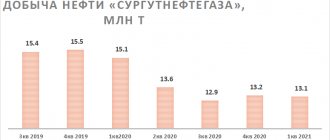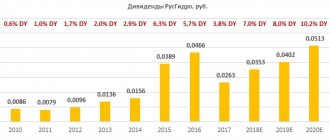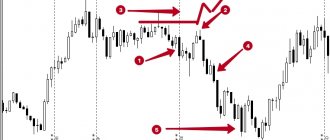The company decided to pay shareholders for the first time
OJSC "Ural Mining and Metallurgical Antanta Capital" of Vladimir Popov, the revenue of the UMMC holding should be $5.3 billion, net profit of about $530 million. Thus, about 15% of net profit will be allocated to dividends. Until now, neither UMMC (established in 2002) nor its main subsidiaries have paid dividends to their shareholders (there have been only minor payments on preferred shares of the Shadrinsky Automotive Aggregate Plant). The company yesterday refused to explain the reason for the change in dividend policy.
UMMC is the second largest copper producer in Russia. It produces 37% of Russian refined copper, 46% of lead and 41% of zinc. UMMC includes about 40 enterprises, the key one being Uralelectromed. OJSC UMMC is the center for consolidating the holding's assets. According to unofficial information, 51% of UMMC is controlled by its president Iskandar Makhmudov, the bulk of the remaining share is divided between Andrei Bokarev and Andrei Kozitsyn.
UMMC has never been a public company. Therefore, only Iskandar Makhmudov and his partners can evaluate the news about UMMC dividends positively or negatively (yesterday they were busy at meetings and could not comment on the prospect of receiving dividends). One of the market participants suggested that the dividends are the return of loans that the offshore shareholders of UMMC could have given for development. But recently UMMC has been actively borrowing on the market through bonds and raising funds from banks. In addition, until now, all the company’s net profit has gone to its development. Metropol Investment Company analyst Denis Nushtaev considers the successful situation on the copper market to be the reason for the decision to pay dividends. Let us remind you that copper prices actually reached a historical maximum in May 2006. Since the beginning of the year, they have grown by almost 100% and reached $8.8 thousand per ton in May. The reasons are the copper shortage and the speculative play of hedge funds. “They made good money and thus decided to reward themselves,” the analyst believes.
At the same time, Mr. Nushtaev notes the disappointment of investors who own shares of UMMC subsidiaries, mainly the key asset (its shares are traded on the stock exchange). According to the analyst, “many expected that the company would start paying dividends on Uralelectromed shares.” However, these hopes were probably not too high - yesterday the company's stock quotes fell by only 1.6%.
Meanwhile, according to Vladimir Popov, the decision on dividends is a signal to the market that the owners of UMMC are preparing it for placement. “In this way they create the dividend history of the company. It's not scary that in 2006 it will be only 15% of net profit. They can gradually increase payments up to 25%,” believes Mr. Popov. It is worth noting that a sharp change in the dividend policy of companies often precedes a change in their owners. In particular, SUAL shareholders last year also decided to pay dividends for the first time in a long time and then announced a merger.
Maria Kommersant-Cherkasova
UMMC declassified its owners
One of the most secretive Russian metallurgical companies has revealed its ownership structure. The share of the founder and president of UMMC Iskander Makhmudov is just over 50%, the general director of UMMC-Holding Andrey Kozitsyn is about 35%, 7.5% each belongs to two top managers and members of the board of directors of UMMC Eduard Chukhlebov and Igor Kudryashkin.
The Ring of the Urals bank disclosed the shareholder structure of UMMC on its website. The Ural Mining and Metallurgical Company - LLC MMSC - owns 95% of the shares in the credit institution.
As of January, in the parent company of the holding, OJSC UMMC, 85% of the shares belonged to Selmareco Limited, and 7.5% each belonged to Burgend Investments Limited and Talberg Investments Limited. In Selmareco, 58.824% belongs to Fesco Investment, which is controlled through three more offshore companies by the president and founder of UMMC Iskander Makhmudov, and 20.588% each belongs to two structures of the general director of UMMC-Holding (UMMC management company) Andrey Kozitsyn.
| Until now, the exact structure of the owners of UMMC was not known; the main owners were Iskander Makhmudov and Andrey Kozitsyn, the names of their partners were not disclosed. |
Thus, as Kommersant writes, Makhmudov controls 50.0004% of the shares of OJSC UMMC, and Kozitsyn controls 34.9996%. Burgend belongs to the commercial director of UMMC-Holding Igor Kudryashkin, and Talberg belongs to the deputy general director of UMMC-Holding, general director of the UMMC Trading House Eduard Chukhlebov.
Meanwhile, the disclosure of the shareholder structure of UMMC is especially interesting in connection with the consolidation currently taking place with. Let us recall that at the end of 2012, UMMC acquired more than 70% of the company’s shares, and now intends to buy out the remaining 5–6% of the enterprise on the market.
Victor Belimov, head of public relations department at UMMC:
— In accordance with the requirements of the law, UMMC issued an offer to the minority shareholders of OJSC Kuzbassrazrezugol Coal Company. Not long ago, UMMC became the owner of a controlling stake in the companies, but now we have made an offer to buy out shares to the owners of those securities that are traded on the free market. The offer was put forward in January, now we are waiting for the market's reaction. Since Makhmudov’s partner in the coal business, Andrei Bokarev, is not among the owners of UMMC, the transfer of Kuzbassrazrezugol to the ownership of the metallurgical holding, according to analysts, may mean either a complete divorce of businessmen, or, conversely, his appearance among the shareholders of UMMC.
Optimization or flight. Why does UMMC hide assets abroad?
It is generally accepted that UMMC is engaged in smelting and processing of metals exclusively in Russia. This opinion is fundamentally wrong: it has a pipe plant in Serbia and there is reason to believe that UMMC owns two large assets in Europe. FederalPress looked into why this might be.
Industrial patriotism
More on the topic
UMMC owners got richer by $1.3 billion in a year
UMMC-Telecom (UMMC's telecommunications subsidiary) plans to develop its own design documentation for power supply and control system cabinets, which it intends to sell, by the end of this year.
Earlier, at the end of last year, UMMC-Telecom created their production in order to supply UMMC enterprises, producing 250 units of products in six months. It produces simple push-button panels for controlling various mechanisms and cabinets with complex fillings intended for use in process control systems in industry (they collect information about the condition of equipment, process it, etc.).
It seems worth rejoicing: Russia is developing its own production of electrical equipment, however, it still seems premature to talk about a real example of import substitution. To produce cabinets, UMMC-Telecom uses element base manufactured by the French concerns Schneider Electric and Legrand, the German Siemens, Rittal and Phoenix Contact. True, Russian products made by DKS and the Cable Alliance holding are also used.
Little things matter a lot
More on the topic
UMMC was not recognized as a systemically important organization
With a careful analysis of the information, there are even fewer reasons for joy. Since Cable Alliance is controlled by UMMC, it costs nothing to give it an unspoken instruction to set lower prices for cables and wires for UMMC-Telecom production than for third-party consumers. As a result, independent enterprises producing similar products may find it more difficult to compete with UMMC-Telecom (after all, their products may turn out to be more expensive than theirs).
Of course, such actions should be monitored by the relevant government body - the Federal Antimonopoly Service, which is designed to ensure conditions for fair competition in the market. But if she wants, she can make it extremely difficult for her to get to reliable information and, in addition, any buyer of electrical equipment is interested in it being cheap (in the current situation in the country, the issue of price has become more relevant than ever).
There is another type of product that can be used for the production of cabinets and consoles. We are talking about a copper busbar - flat rolled products for electrical purposes, supplied by UMMC-OTsM - a rolling holding holding that manages the Kirov and Revdinsky Non-Ferrous Metals Processing Plants (KZOTsM and RZOTsM, respectively) and the Copper Pipe Plant, located in Serbia. From all of them, KZOTsM can make a copper busbar, while the rest specialize in the production of pipes (RZOTsM also produces rods, wire, profiles and casting blanks). There may also be scope for “efficient” pricing.
Disappeared group
A study of the UMMC-OCM website revealed an interesting detail: there is not a word on it about the French group Gindre, which became part of it in September 2015 and produces copper bars and flat products (including flexible tires).
More on the topic
“Living Shemur”: pollution of rivers in the north of the Sverdlovsk region does not stop
For UMMC-OTsM, the acquisition of Gindre was a gift of fate - Gindre not only expanded the product line of UMMC-OTsM, but also provided it with access to foreign technologies for the production of rolled copper products and opportunities for export sales, since at the time of the Gindre transaction it had 10 enterprises around the world . With the purchase of Gindre, UMMC itself became a truly transnational corporation.
In turn, the Gindre portal does not say anything about belonging to UMMC. But it mentions that in 2012 Gindre, together with the metallurgical company Montanwerke Brixlegg, was acquired by the Austrian Umcor Holding. In 2015, Gindre was purchased by the Austrian company Alpin; in 2021, Umcor Holding again became its owner. There is not a word about UMMC; for sure, it did not own Gindre.
It was not possible to find the Umcor Holding website on the Internet. However, a portal was found for the Swiss company Umcor, which apparently owns Umcor Holding. This assumption is supported by a simple fact - it lists the acquisition in 2012 as one of the key moments in the history of Umcor. Gindre and Montanwerke Brixlegg. In 2014, Umcor bought a stake in the authorized capital of the Chelyabinsk Zinc Plant (ChZP). Which one exactly is not said.
It turns out that the opinion about the complete control of UMMC over CZP is fundamentally wrong? CZP's official reporting does not add any clarity. According to it, UMMC owns 40.1% of CZP shares, the Dutch NF Holdings – 58%.
Who owns CZP?
Everything will fall into place if we assume that NF Holdings is somehow connected with UMMC and at the same time Umcor. Then a banal thing may become obvious: Umcor, through NF Holdings, may own a stake in the authorized capital of CZP (probably the above-mentioned 58%) and UMMC-OTsM quietly gave or sold it to Gindre.
More on the topic
Undeservedly forgotten. Which enterprises have not received systemically important status?
In general, such a hidden information policy is quite in the spirit of UMMC. For example, in August 2021, there was a change of director at KZOTsM - Sergey Makurov was appointed to replace Alexander Darensky (previously he was the technical director of the Copper Pipe Plant). There was no official announcement about this event, although Alexander Darensky, who headed the KZOTsM for many years and did a lot for its development, was worthy of at least a positive mention in the press release.
It remains to figure out why UMMC needed to remove Gindre from UMMC-OCM. Three options come to mind: either it may be more profitable for the owners of UMMC to store income from the activities of Gindre (and Montanwerke Brixlegg) in foreign banks, at the same time optimizing taxes, or they want to hide certain assets just in case of emergency (anything can happen in life) , or both. And, unfortunately, our country does not see any benefit from the presence of UMMC enterprises abroad and, it seems, is not expected.
No comments were received to a FederalPress request sent by email to the UMMC press service.
Photo: pxfuel.com








